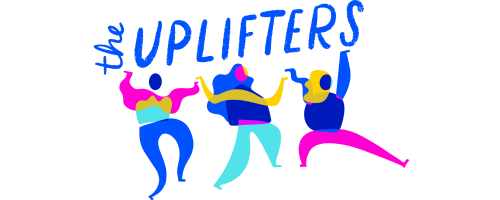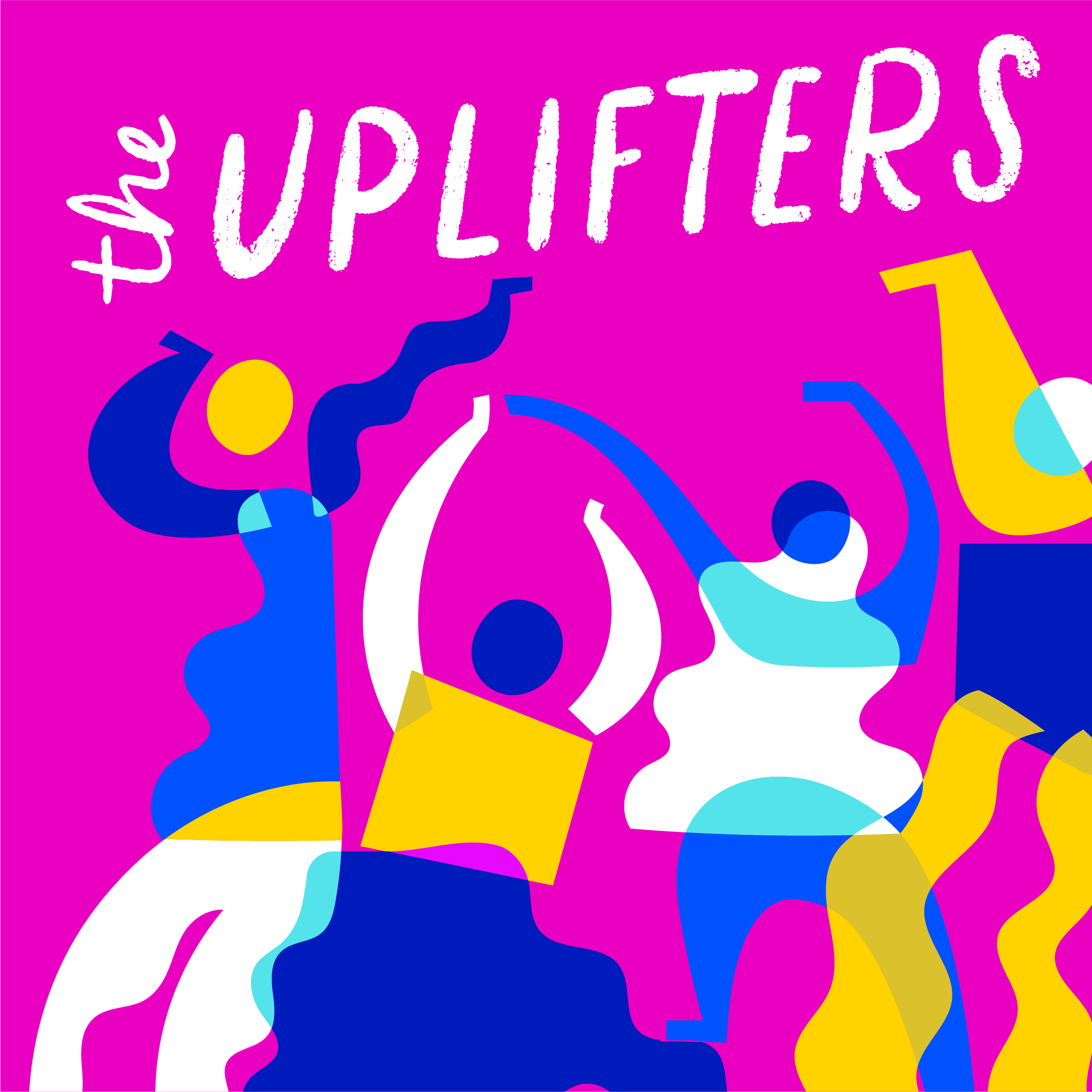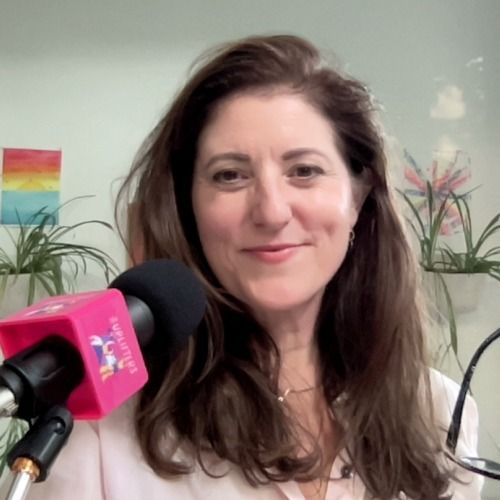Episode 69
Eliza Factor is Cultivating Community for Families with Disabilities
In this week's episode, you’ll meet Eliza Factor, an artist and author whose life took an unexpected turn when her first child, Felix, was born with significant disabilities. What began as a challenging and often isolating experience blossomed into a beautiful journey of discovery, innovation, and community-building.Eliza's story begins in 2003 when she contracted chicken pox during pregnancy. While she recovered, the illness profoundly affected her unborn son. Felix entered the world unable to move independently or communicate through traditional language. Rather than seeing limitations, Eliza saw an opportunity to reimagine how we connect, communicate, and create inclusive spaces.
Driven by a desire to build community for families like hers, Eliza founded Extreme Kids and Crew, a program for children with disabilities that welcomed entire families. This initiative grew from her realization that parents of children with disabilities often neglect their own needs while focusing intensely on their children's care.
As Felix approached adulthood, Eliza confronted a new challenge: the lack of meaningful work opportunities for adults with disabilities. Her solution? Lonely Worm Farm, an innovative agricultural project designed with inclusion at its core. Picture wheelchair-accessible paths lined with berry bushes and waist-high planters, allowing individuals of all abilities to participate in the joys of farming and harvesting.
Through her journey, Eliza discovered a new language of connection beyond words, learning to communicate with Felix through body language, energy, and presence. This profound shift in perspective not only deepened her bond with her son but also influenced her art, allowing her to capture the essence of human experience in richer, more nuanced ways.
5 Uplifting Lessons from Eliza's Story:
1. Embrace the unexpected: Life's challenges can lead to beautiful innovations and personal growth.
2. Create what's missing: If you can't find the community or resources you need, take the initiative to build them yourself.
3. Redefine communication: There are many ways to connect beyond words; presence and energy speak volumes.
4. Trust your instincts: Sometimes the best ideas come from following your intuition and personal experiences.
5. Share your vision: Don't be afraid to involve others in your dreams; collaboration can turn small ideas into powerful movements.
Eliza's story reminds us that uplifting happens not just from overcoming obstacles, but from rebuilding our spaces to be more inclusive and connective. What do you wish existed in the world? Maybe it’s just waiting for you to create it.
Transcript
Nomination: My friend Eliza ticks every uplifter box and more. Always thinking of others with generosity and creativity, while solving important problems for people who are so often overlooked, Eliza embodies the [00:00:30] Uplifter.
And I'm so lucky to know her. And I'm so happy to share her with you.
ng her friend, Eliza Factor. [:So Eliza, tell us a little about
Eliza: you. I [:And Felix lost a lot of the white matter in his brain. And so when he was born, he was really floppy. And we didn't really know what was [00:01:45] wrong because, you know, some kids survived the chicken pox in the womb just fine. Thank God. Over time it emerged that he was going to be significantly disabled for life.
in his case is he can't move [:Definitely can move to steal your ice cream cone, but he can't like hold a pen. So like [00:02:30] just the way that the world is organized for most of us is completely, uh, you know, like completely a foreign country for someone like Felix. And so when you're close to someone, Like that you start to see how strange the world that you live [00:02:45] in is, and how narrow most of our structures are.
til someone like Felix comes [:We focus so much on words and what's quantified. [00:03:30] So Felix kind of brought a lot of. My childhood gifts back that stuff had been kind of, you know, batted out of you through school and degrees and all that stuff. So that's kind of the [00:03:45] gifts that he brings to me and to others. But it's also very alienating and lonely and painful.
unger kids who fit in to our [:But [00:04:15] when you have a child like Felix, the community just isn't there. There's therapists who are wonderful, and doctors, but it's hard to find other parents. So anyway, when the younger kids were born and, and then I was involved in this wonderful community around them, I was like, oh, I wanna figure out how to do this for other families that only have kids with disabilities or whatever. And also, I just wanted to [00:04:45] meet other parents who were dealing with more my situation.
n't need to go to mama yoga, [:And so like, if I could make the child's art class for the whole family and get the parents also making art and just like get the parents talking to each other, then they're weaving this support group that's happening [00:05:30] organically. Now Extreme Kids and Crew is 13 years old and I'm not involved in it anymore. I stepped off the board because Felix is getting, he just turned 21, so he needs a place to work. [00:06:15] 70 to 80 percent of adults with disabilities are unemployed. And, you know, wait lists to get into decent day head programs, which, you know, just like nice community programs can be 10 years.
There's so little [:So farms are a part of our life. So we [00:07:00] started Lonely Worm Farm, which is in the Hudson Valley, in Hyde Park. We now have like a three acre field that's been beautifully designed to grow into a food forest. If [00:07:15] anybody's interested in permaculture, that's a permaculture term, but it's an ecological garden that will grow into a forest that will be filled with fruit trees and nut trees and berries and herbs.
[:Aransas: How incredible. Wow. What a journey. And I hear in that, this. [00:08:15] Openness to the responsibility to create what's missing in your life.
exist and feel resigned and [:Because in each of these instances, if I understand correctly, you were doing things that you didn't technically have any business doing. You had no background or experience in these arenas. And so to courageously walk up and say, I'm going to make this [00:09:00] thing based principally on my understanding of my child and our needs, I think is extraordinarily important.
Bold and brave.
n, it doesn't feel that way, [:I don't know where it's gonna take me, but I have to do it. I can't follow a map. I need to, so I'm just following myself. And Felix is my guide.
t a beautiful perspective on [:Because I think a lot of us get stopped by needing a map, needing a clear [00:10:00] set of directions and find ourselves unable to do anything. And so I think to Eliza it means to tap into the trust, to tap into the faith that you will find [00:10:15] the directions as you build the map.
, maybe talk to some people, [:And then, you know, you're on the right path, but the people that show up to help you, like you can't do it alone. And so, and so you kind of expose yourself and [00:11:00] you'll people go all kinds of responses. But if you get that kind of juicy connection with somebody else, who's like, yes. And then they're going to tell you, Oh, go talk to this person.
his kind of invisible social [:Like. [00:11:30] I can do that, but it's not something I enjoy doing. So I'm always trying to dump stuff on other people. I'm like, you look like you could do this. But yeah. So I think, I think that that kind of feeling of needing to control or wanting to be the person in [00:11:45] charge can be exhausting and can hamstring a lot of these kinds of projects.
nfluential or even inspiring [:To, um, [00:12:30] sense tested with others to see what's played back to you, what begins to expand from that, and then to have the trust to share the vision and to let others [00:12:45] co lead and co create with you. And I think so often we create from a place of fear and that's really limiting because we're like, Oh, I've got to protect the baby.
Eliza: Yeah. Yeah.
we hold it so tight that we [:Eliza: Yeah. So you're such a good listener. That's wonderful. I think that it's definitely where my [00:13:15] process and I definitely like the sharing the baby. I'm married to a great husband, father type.
's been wonderful. Yeah. And [:Aransas: So let's talk about that because we strangle our own energy through exhaustion and that desire to do more, to [00:13:45] get it all done, to be everything How did you give yourself permission to take care of yourself?
Eliza:, I [:I struggle with this feeling of self indulgence [00:14:15] sometimes when I'm doing stuff that's like meditating. It's not really self indulgent. I mean, you're just as precious as your children. Right. You gotta love yourself like you love your kids.
sas: And I think if I get to [:Like, are you going to be like, don't have a glass of wine? And I don't know, do your taxes, but you're like, you're not going to be giving yourself. You're like, you a wonderful, you lived, you enjoyed your life, your [00:14:45] precious life. I mean, when you're thinking like it's incredible that we're alive, you know, it's incredible.
This earth is incredible.
bout your story and a bit of [:Eliza: Yeah.
Aransas: What was that journey like learning your son's language?
e wasn't going to be able to [:Everyone's like, Stephen Hawking, you [00:15:45] know, there's all of this kind of like, you can, you can connect through ideas and language and music and art. I mean, there's just many ways of connecting, right? So that's where our minds went immediately to the pleasure that books have given us and the real sense of freedom [00:16:00] that writing often gives me.
ght before Felix came along, [:That was a misperception. It was being with these people that their energy or whatever it is, made [00:16:30] me feel comfortable. And so then because I was comfortable, I could speak and we could just have fun. And so like the words are almost icing on the cake. They're not as important as you think they are. And also because of, once [00:16:45] I figured that out, which was just purely Felix, I started understanding how misleading words are in conversation.
, PTA stuff. I'd be watching [:And even if you hear the words, even if they're written down, everybody kind of translates words differently. So they mean different things to different people. So they cause so much friction, and they [00:17:30] sometimes feel like they're more bother than they're worth. So yeah, so he really opened my mind to how much of communication is nonverbal.
ore on the body, more on the [:You can feel hunger. And it's like the baby isn't saying anything, but you can see it in their skin, their eyes, because you know, Felix, this practice kept expanding with Felix. I remember I was walking in the park once and I was watching a [00:18:15] squirrel and it was leaping from branch to branch. And I could feel my core muscles.
was, it felt so good. It was [:You know, like they can communicate with animals. I was like, Oh, well, that doesn't seem so strange. When you really, really just kind [00:18:45] of get out of words. Yeah,
Aransas: I think the best word I have for it in this moment is presence.
Eliza: Yeah.
methods of communication, it [:Oh,
Eliza: yeah.
ere is this sense of, Oh, we [:I see so much more when I take a walk than when I take a run, but I see so much more when I [00:19:45] run than when I'm in a car flying by. And so it's like trying to sort of step down and allow ourselves to see more and to feel more.
you're looking, when you're [:Like. People's degrees or education wasn't very useful in knowing whether they'd be good at it because it's really is the degree of presence that you bring [00:20:15] into the room. And that's not something that most people learn at school. So, you know, he's had wonderful caretakers that have been college grads for sure, but just as great.
It's not better. Who haven't been?
sas: It's really interesting [:I like
his because when Jason and I [:And it was beautiful, but we didn't, you know, we didn't [00:21:15] have time to do like soil tests and stuff like that before the sale. So we went out shortly after the sale and dug 23 holes in this field and 15 holes in that field. The soil test is like a little hole, like [00:21:30] 6 to 8 inches. inches deep. You take a little bit of the soil, send it to the extension.
dry, just filled with rocks [:And this worm was [00:22:00] like, dusty. Like, you know, you could just see the dust of it and it looked so scared, like, What are you doing? I'm alone in the universe! Anyway, we named the farm after this worm with the intention of bringing more worms to the soil and regenerating the [00:22:15] soil. So that's the name and the kind of trinity of ideals are the arts, inclusion, and ecology.
and maple syrup, which we're [:Ways you can get involved, like you could come and work on the farm every day and there'll be like a wheelchair accessible, pick your own orchard and berry patch and stuff like that. So you could just come with your [00:23:00] family and spend the day picking yummy things to eat and doing an art project. So, you know, like there should be all kinds of ways to get involved.
sical or age related or, uh, [:Aransas: How beautiful. I
at Felix is living close by, [:That'd be great. Three or four days a week and he spends, you know, holidays and stuff with us and but has a independent life [00:23:45] and that the farm just is a hub for all families and adults to meet each other and to fertilize each other.
ar about the impact this has [:Yeah, no, it's always, it feeds me for sure. I'm so glad Sabrina introduced us. I'm [00:24:15] so happy. Well, I hope you
Nomination: can come
Eliza: visit, tell your people, like, I love it. Just tell them to go to the website and if they're in the Hudson Valley, all they have to do is email me and I'll give them a tour. I really love visitors.
Aransas: I would love [:Eliza: and leading such a lovely conversation.
e getting a boost from these [:com. Head over to Spotify, Apple Podcast, or wherever you get your podcast, [00:25:00] and like, follow, and rate our show. It'll really help us connect with more uplifters, and it'll ensure you never miss one of these beautiful stories. Mmm.
Music: Big love [:Toss a star in half for beer around. Best love for relish in a new. [00:25:30] Plant a tree in springtime Dance without all hindsight Bring the sun to twilight Lift you up, woah Lift you up, [00:25:45] woah Lift you up, woah
Lift you up
Lift you up, whoa, [:

